#sri lankan civil war
Explore tagged Tumblr posts
Text


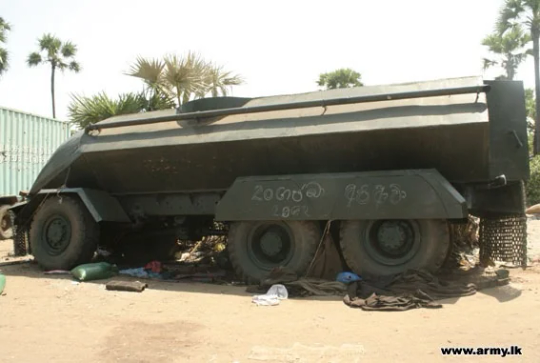


Tamil Tiger's improvised APC, looking properly sci-fi. 2009
42 notes
·
View notes
Text
There needs to be an M.I.A. studies, it's fascinating that an artist came out hitting strong about life in a country-wide civil war, frank about the necessity of violence as a minority in a post-colonial world, gets embraced by western music criticism to the point of like completely overshadowing her point - and now people find her on the spotify frat party playlist bc of Paper Planes. I think part of the process is a false-equivalency empathy, like Oh! she's in favor of the freedom fighters against the government, I'm also anti-government, we all hate the government here in the west, we get it! but it's like actually no we don't. I haven't listened past album 3, but I'm also curious if that Bad Girls song is like low-key taken over by a lib feminist sentiment, like Those poor women over there ! Pour one out for the free world
#unfortunately i dont know much about the sri lankan civil war im kind of spitballing here#standard american knowledge of world politics at work here
0 notes
Text
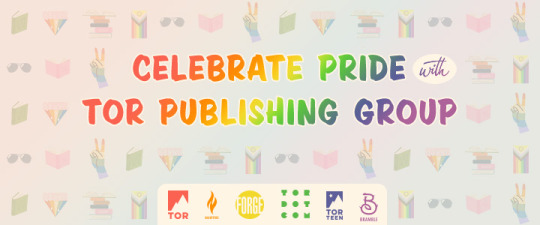
Celebrate Pride with Tor Publishing Group!
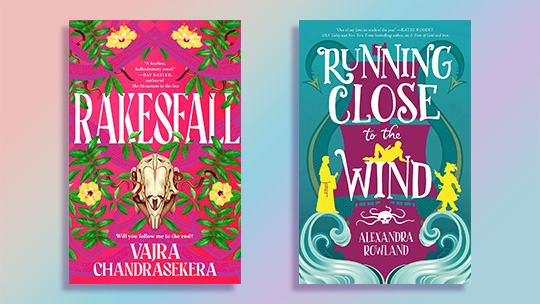
Rakesfall by @adamantine
They met as children in the middle of the Sri Lankan civil war. Later, in a demon-haunted wood, an act of violence linked them and propelled their souls on a journey through the ages. As they reincarnate ever deeper into the future, a truth emerges: Some stories take more than one lifetime to tell.
Running Close to the Wind by @ariaste
In this queer pirate fantasy, Avra Helvaçi has accidentally stolen the single most expensive secret in the world. To avoid capture, he flees to the open sea, where only his on-again, off-again ex aka pirate Captain Teveri az-Ḥaffār can help him survive, profit, and become a legend.
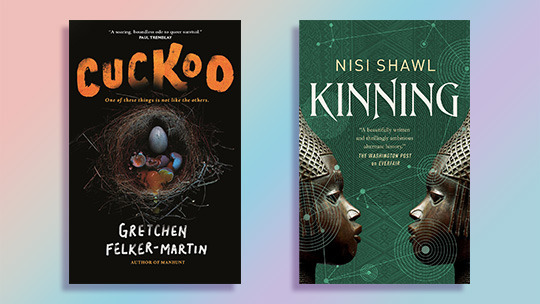
Cuckoo by Gretchen Felker-Martin
Something evil is buried deep in the desert. It wants your body and wears your skin. Welcome to Camp Resolution, a queer conversion center where everyone leaves a different person. In 1995, seven queer teens were abandoned here by their parents, but survived. Sixteen years later, they’re scarred and broken, but back to face an evil that threatens the world.
Kinning by Nisi Shawl
In this alternate history where barkcloth airships soar and former colonies claim freedom from imperialist tyrants, the identity of the island of Everfair still wavers. Victorious in the wake of the Great War, a new threat looms. Can Everfair continue to serve as a symbol of hope for anticolonial movements around the world, or will it fall to forces within and without?
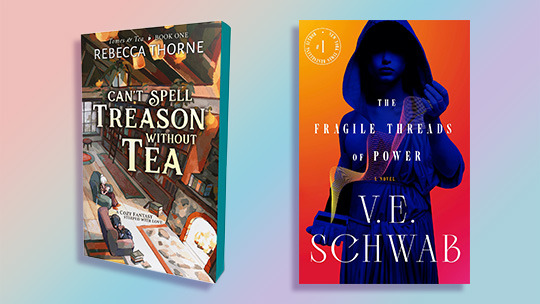
Can’t Spell Treason Without Tea by @rebeccathornewrites
Can one of the Queen’s private guard and the most powerful mage in existence leave their lives behind to settle down in their new bookshop that serves tea? This cozy fantasy is steeped in sapphic romance and nestled on the edge of dragon country.
The Fragile Threads of Power by V. E. Schwab
Once there were four worlds, nestled like pages in a book, each pulsing with fantastical power and connected by a single city: London. After a desperate attempt to prevent corruption and ruin in the four Londons, there are only three. Now the worlds are going to collide anew—brought to a dangerous precipice by the discoveries of three remarkable magicians.
Now available in paperback!
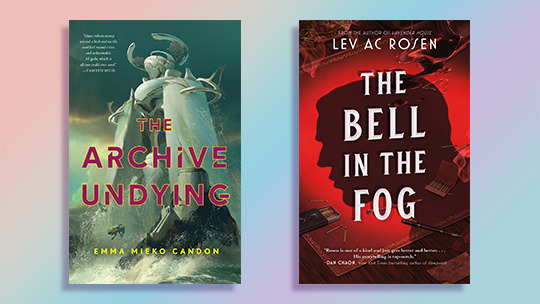
The Archive Undying by @emcandon
This is a story about misplaced faith, complicated love, so much self-loathing, and yeah—giant robots. Plugged into his AI god when its apocalyptic corruption renders him unfortunately immortal, sad gay disaster Sunai takes a die-again-or-die-trying approach to things. Unending life’s tough when intimacy is somehow scarier even than either of the warring police states set on turning you into a weapon or the rogue undead mecha-fragment of your old god that wants to eat you.
Now available in paperback!
The Bell in the Fog by Lev AC Rosen
A dazzling historical mystery that dives into the shadowy, closeted world of the Navy, emerging in the gay bars of the city. It’s a whirlpool of missing people, violent strangers, and scandalous photos in 1952 San Francisco.
Now available in paperback!
Celebrate Pride with more titles from Tor Publishing Group here!
#the archive undying#emma mieko candon#the bell in the fog#lev ac rosen#can't spell treason without tea#rebecca thorne#the fragile threads of power#v e schwab#cuckoo#gretchen felker-martin#kinning#nisi shawl#running close to the wind#alexandra rowland#rakesfall#vajra chandrasekera#tor books#tor publishing group#bramble romance#nightfire books#forge books#bramble#tordotcom publishing#tdcp#lgbtqia+#gay reads#tbr#new books
4K notes
·
View notes
Text
Israel has thus fully embraced the “war on terror” and richly profited from it. One of the most successful though bloody counterinsurgency battles of the early twenty-first century was the Sri Lankan government’s destruction of the Tamil Tigers militant group. Israel played a key, though largely unpublicized, part in Colombo’s successful campaign in a civil war that killed and disappeared more than 200,000 people, mostly Tamils, over a quarter-century that ended in 2009. Israel sold Kfir fighter jets and trained the Special Task Force, a brutal unit of the Sri Lankan police. Sri Lanka borrowed the Israeli playbook during the last stages of the civil war and ignored calls by NGOs, human rights organizations, and foreign governments to cease violence. The military stopped when the Tamil Tigers were completely decimated and Velupillai Prabhakaran, its leader, killed. Israel also helped generations of Sinhalese politicians build and maintain Sinhalese enclaves in the north and east of Sri Lanka, areas where most Tamils live. The aim was to create buffer zones around Tamil-majority areas and establish an unofficial occupation of Tamil territory. These plans continued after 2009 and Sinhala colonization has never stopped. These ideas were directly taken from Israel’s presence in the West Bank, where Palestinian sovereignty is denied with numerous fortified Jewish colonies. Israel signed a US$50 million deal with Sri Lanka in 2021 to upgrade the country’s Kfir jets.
Antony Loewenstein, The Palestine Laboratory: How Israel Exports the Technology of Occupation Around the World
648 notes
·
View notes
Note
hello! i saw you talk abt queer desi literature and was wondering if by any chance you know of some queer tamil novel/literature recommendations? totally fine if not, have a great day<3
These are the only ones coming to mind, it's a bit difficult tracking down primarily own voices writing in South Asian queer literature:
The Truth About Me: A Hijra Story by A. Revathi (non fiction, memoir, trans fem author) – this one is a really detailed and powerful story about a Tamil actor and activist who fled her home as a teen and joined a hijra community. it's obviously rather depressing, and not exactly a story of queer joy, because it depicts the lived reality of Indian trans women outside of the urban queer elites, but it's also an incredible story.
Funny Boy by Shyam Selvadurai (fiction, historical, gay author) – a novel about a gay Tamil boy growing up during the 1980s phase of the Sri Lankan Civil war. full disclosure, insofar as my knowledge goes, Selvadurai identifies as Sri Lankan-Canadian (his father was Tamil) and I'm fully aware of how the 2020 Deepa Mehta movie adaptation controversy worsened things, but I took this recommendation from an LGBTQ Tamil blog online. I did not particularly enjoy Cinnamon Gardens by the same author, tbh.
Hungry Humans by Karichan Kunju (fiction, novel, historical) – first published in 1977, it deals with two Tamil characters, one of whom is grappling with homosexuality, greed, consuming desire and abuse trauma. I have not read this book, with full transparency, and the reviews are very mixed, with some Tamil reviewers saying that while the themes explored are compelling, the writing and authorial stances feel a bit dated, especially on issues of caste.
Siren's Desire by Samirah the Sapphic Siren (poetry, sapphic author)– this is a poetry collection by a Tamil Dravidian sapphic visual artist and poet that centres brown QTPOC as bodies who actively desire, and are not just passive objects tokenized for their desirability. Tackles themes of intersectional queerness, colorism, and healing from trauma. Btw you can directly support Samirah here (shop link) and here (patr30n), as well as on instagram (@/thesapphicsiren).
The First Beautiful Woman In The World by Leena Manimekalai (poetry, bisexual sapphic author)– this is a bisexual poetry collection by a Tamil writer, activist and director who has created several works depicting trans and/or queer identities in an Indian Tamil societal context. Unfortunately, I wasn't able to find English translations of her works; she has more than one sapphic poetry collection apparently, but I could not track a single work down online (if any Tamil followers can help out it will be great!). you should follow her on Instagram nevertheless and support artists who vocally support the voices of marginalized communities and resist alt-right fascist censorship.
#answered ask#yioh#mimiwrites#book recs#books#book recommendations#desi#desiblr#desi queer#lgbtq books#gay#lesbian#bisexual#trans authors#sapphic authors#litblr#translated literature#bookblr#lgbtq
153 notes
·
View notes
Text
Kat's Top Books of 2023
Was inspired by someone else's post to do a Kat's top 5 books of the year post culling from my #recently reads. I read a lot this year and encountered a lot of great titles, but these ones were particularly memorable:
Vagabonds! by Eloghosa Osunde. Interconnected short stories following the lives of queer misfits and outcasts in Nigeria. I have a passage saved on my phone. I read this back in January so I don't remember the contents as much as the feelings it evoked, but it was beautiful and haunting.
Don’t Fear the Reaper by Stephen Graham Jones. Read My Heart is a Chainsaw first if you haven't already. The books pit Jade Daniels, a young woman with a trauma she's refusing to face head on but instead buries in an obsession with the moral logic of slasher films, against irl slashers who keep coming to town. Bonus points for wired jaw representation, aka my future.
Brotherless Night by V.V. Ganeshananthan. Set during the Sri Lankan civil war following a young Tamil woman who's caught in the middle as loved ones join the Tigers. It starts with a striking passage that you think means one thing and then comes back later in a way you don't expect that's a huge gut punch.
The Spear Cuts Through Water by Simon Jimenez. A high fantasy story that is also a diaspora story as the characters' scattered descendants watch history play out. Dips into everyone's thoughts to create a chorus POV that's really effective. Note - incredibly gruesome. Organs, lovingly described, etc.
The Golem of Brooklyn by Adam Mansbach. A stoned art teacher accidentally creates a golem who decides his mission is to stop an upcoming alt right rally. Explores the interactions between the old world and the new and the weight of historical trauma - every golem shares the same ancestral memory. Carries its tensions to the very last page and leaves the reader to supply the answers.
(Honorable mention to System Collapse which didn't make it into the #recently read posts, but I had a great time!)
Nonfiction shoutout to A City on Mars which sourced so many delightful space facts and gave me a lot to think about re: SF worldbuilding that is at all grounded in reality. Plus it was really funny.
51 notes
·
View notes
Text

Five-barreled heavy mortar operated by Sri Lanka government forces during the Sri Lanka Civil War, 1990s
42 notes
·
View notes
Note
Hello! Could you recommend some fics from travel literature? My reach only extends to Dalrymple's In Xanadu as of yet. And I suspect a growing love for this genre. Also, would love to know your thoughts on this genre. 🌼🍁
Here you go! It's a mix of fiction and nonfiction, and anything containing travel qualifies even though it might not intentionally be travel writing
Non-fiction
The Old Ways by Robert Macfarlane: the authors follows ancient routes, hollows and pathways in Britain; is generally about the communal nature of walking.
Great Railway Bazaar by Paul Theroux: about journeys through Asia on railways. Theroux is among my favourite travel writers, also because he almost exclusively travels by and writes about trains. Do check out his The Old Patagonian Express
Nanologues by Vanessa Able (or alternatively, Never Mind the Bullocks): a travelogue of a woman who drove through India in a Tata Nano. It's really well done. And if you'd like the immersive experience, she also ran a blog while she was driving.
Round Ireland with a Fridge by Tony Hawks: it's exactly what it sounds like. The author loses a bet, and consequently carries a small fridge around Ireland. It's really really funny and warm and kind and great holiday reading
On Travel by Charles Dickens: this is a few essays about the places he visited, the process of travel, and at times quite like a travel diary
Fiction
Outline trilogy by Rachel Cusk: all three books follow a narrator through about a decade or so of her life; a bulk of the story happens when she's travelling, and her state of always passing through does interesting things to the narrative
On the Road by Jack Kerouac: I love Kerouac, and this is the first of his books that I read. It's his journey through and to the West Coast in the US. That said, it is a messy book and it does test your patience
Flights by Olga Tokarczuk: this is about travel, mobility, the body and experience. It's a whole bunch of short essays, notes, some stories, all of whom come together to be about travel and what movement means now
A Passage North by Anuk Arudpragasam: follows the narrator who is on a journey home after he's received some distressing news. His life sort of unspools while he's travelling, and through that, it is about the afterlife of the Sri Lankan civil war, memory and what it means for his relationships
I hope this helps!
27 notes
·
View notes
Text
Posting after a long time but here's a suggestion to all the people out there crying about Israel-Palestine...
How about you first look after your own country? You can't have a literal silent civil war or systematic genocide of minorities in your own country and preach stuff about peace and rights. C'mon, South Asians, my dear Indians, Bangladeshis, Pakistanis, Nepalis and Sri Lankans, you know what I'm talking about. Your nations are not doodh ka dhula (a hindi idiom for pure or innocent), so maybe take care of those issues too while you're at it? Our countries are probably the epitome of racism, discrimination and persecution lol. And Indians, yo, Manipur??? :)))
#israel#palestine#india#pakistan#bangladesh#nepal#sri lanka#save manipur#south asia#posting after long
35 notes
·
View notes
Text
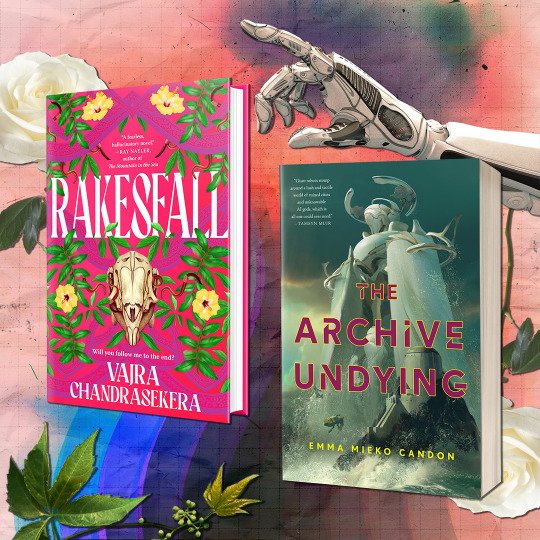
Celebrate Pride with Tor Publishing Group!
Rakesfall by @adamantine
They met as children in the middle of the Sri Lankan civil war. Later, in a demon-haunted wood, an act of violence linked them and propelled their souls on a journey through the ages. As they reincarnate ever deeper into the future, a truth emerges: Some stories take more than one lifetime to tell.
The Archive Undying by @emcandon
This is a story about misplaced faith, complicated love, so much self-loathing, and yeah—giant robots. Plugged into his AI god when its apocalyptic corruption renders him unfortunately immortal, sad gay disaster Sunai takes a die-again-or-die-trying approach to things. Unending life’s tough when intimacy is somehow scarier even than either of the warring police states set on turning you into a weapon or the rogue undead mecha-fragment of your old god that wants to eat you.
Now available in paperback!
#the archive undying#emma mieko candon#rakesfall#vajra chandrasekera#tordotcom publishing#lgbtqia+#gay books#speculative fiction#science fantasy#tbr
497 notes
·
View notes
Text
I don't feel smart enough to understand the Sri Lankan Civil War
2 notes
·
View notes
Text

In her Reith lecture of 2017, recently published for the first time in a posthumous collection of nonfiction, A Memoir of My Former Self, Hilary Mantel recalled the beginnings of her career as a novelist. It was the 1970s. “In those days historical fiction wasn’t respectable or respected,” she recalled. “It meant historical romance. If you read a brilliant novel like I, Claudius, you didn’t taint it with the genre label, you just thought of it as literature. So, I was shy about naming what I was doing. All the same, I began. I wanted to find a novel I liked, about the French Revolution. I couldn’t, so I started making one.”
She made A Place of Greater Safety, an exceptional ensemble portrayal of the revolutionaries Danton, Robespierre and Desmoulins, but although the novel was completed in 1979, it wasn’t published until 1992 – widely rejected, as she later explained, because although she thought the French Revolution was the most interesting thing in the world, the reading public didn’t agree, or publishers had concluded they didn’t. She decided to write a contemporary novel – Every Day Is Mother’s Day – purely to get published; A Place of Greater Safety emerged only when she contributed to a Guardian piece about writers’ unpublished first novels.
Genre is a confining madness; it says nothing about how writers write or readers read, and everything about how publishers, retailers and commentators would like them to. This is not to criticise the many talented personnel in those areas, who valiantly swim against the labels their industry has alighted on to shift units as quickly and smoothly as possible.
Consider the worst offender: not crime, horror, thriller, science fiction, espionage or romance, but “literary fiction”. It can and does contain many of the elements of the others, but is ultimately meaningless except as a confused shorthand: for what is thought clever or ambitious or beyond the comprehension of readers more suited to “mass market” or “commercial” fiction. What would happen if we dispensed with this non-category category altogether? Very little, except that we might meet a book on its own terms.
Is last year’s Booker prize winner, Shehan Karunatilaka’s The Seven Moons of Maali Almeida, a ghost story because its central character is dead, or a thriller because he has to work out who has murdered him? A historical novel because it is set during the Sri Lankan civil war, or speculative fiction because it contains scenes of the afterlife? And where do we place previous winners such as Lincoln in the Bardo by George Saunders or A Brief History of Seven Killings by Marlon James?
Finding ways to describe narratives is not itself the problem, and nor is genre in the wider sense. An understanding of literary traditions that have formed over centuries and across cultures is not essential to the enjoyment of an individual book, but helpful to a broader appreciation of how texts interact with one another through recurring styles and motifs. The urge to categorise has had a deadening effect, reinforcing hierarchies that rely on an idea of what is “serious” and what is not, and by the genuinely liberating understanding of literature, in all its forms, as a playful, thoughtful, experimental tussle with words and ideas.
None of that means one mightn’t enjoy wandering down the forking paths of the literary woods. During the lockdowns, I found great comfort in psychological thrillers of a particular cast: a form of domestic noir in which the usually female protagonist’s apparently enviable life was undermined by a combination of unresolved dissatisfactions (a distant or otherwise problematic husband, a house renovation gone wrong, bills piling up, recalcitrant or troubled children) and an interloper, often in the form of a glamorous new neighbour. I was fascinated by the way these novels articulated a set of contemporary bourgeois anxieties – property values, long-term monogamy, school places, stalled careers – and then imagined how they might be alleviated by the arrival of a disruptor, only to discover that the status quo isn’t all that bad. Often set in smartish London suburbs, these books occasionally packed their casts off on holiday to a rented villa that not every participant could comfortably afford, and in which a body would quickly turn up amid the abandoned plates of tzatziki and glasses of retsina. I began to imagine that if I had the wit and skill to write a parodic mashup, I might call it Kitchen Island. But I don’t, because these efficient entertainments were also, at their most successful, impressively executed feats of plotting and atmosphere.
That I might feel these novels were, in that grimly joyless phrase, “guilty pleasures” because I read them more quickly than I might read the work of Jon Fosse or James Baldwin or Isabel Waidner is to misunderstand the potential of variousness. They were simply another facet of my reading life, speaking to a different impulse, yielding a different reward. I might eat a boiled egg for lunch and immerse myself in a complicated recipe of unfamiliar ingredients at dinner time; finish a cheerful romcom and then turn to a painstakingly detailed documentary. These are not perceived as contradictions, but as perfectly reasonable options available to those of us lucky enough to have them.
I’m returning now to a new novel, Orbital by Samantha Harvey, one of my favourite contemporary novelists. It is set in space, on board a craft circling the Earth, filled with astronauts from different countries and cultures, undergoing physical, mental and emotional changes. Her last novel, The Western Wind, was set in 1491, and she has also written about Alzheimer’s disease, Socrates, infidelity and insomnia. Categorise that.
Daily inspiration. Discover more photos at Just for Books…?
20 notes
·
View notes
Text
about a month after I last read any books, I finally got around to posting my progress on @batmanisagatewaydrug's book bingo! Besides the childhood favourite, I'm trying to make all my entries on this list new reads: I've had a long dry spell on reading books new to me (since about 2020!) coincident with a bit of a depressed period in my life, but I read a lot of books in december of last year, and I'm hopeful this challenge will help me keep that energy going! We're doing pretty good so far....

Thoughts on the filled squares under the cut:
Fantasy: Piranesi, by Susanna Clarke
I read this book because it was referenced in a Jacob Geller video about infinity, but it blew me away not with the conceptual infinite, but with the very contained and finite characters. I really like it when authors refute the idea that people are fundamentally cruel or selfish, and Clarke does this beautifully in Piranesi. I finished it and them immediately bought a copy for my mum. Highly recommended to everyone.
Set in a country you have never visited: The Seven Moons of Maali Almeida, by Shehan Karunatilaka
I picked this up from a friend's coffee table and was immediately captivated. It's set in Sri Lanka, where I've never been, and also in the afterlife, where I've also never been. Could also have put this in historical fiction, since it's also set in the 80s, during the Sri Lankan civil war, but I've got other plans for that square.
This was also fantastically good - a cynical protagonist in an awful situation, but one where it still matters to do the right thing. I should have seen the end coming, but I was so caught up in Maali's own priorities that I didn't. Made me cry. Read if you like second-person perspective and bittersweet tragedies about gay war photographers.
Read and make a recipe: Ben Ben Noodles, by Meera Sodha
This is from the cookbook EAST, which a family member got for me a few years ago. I was a bit nervous about the Sichuan peppercorns in this recipe - I've been overpowered by them before - but the combination of the mushrooms, gherkins and tahini with them really leveled things out. One of those recipes with a lot of strong-tasting ingredients that somehow manage to balance each other out rather than fighting to overpower the dish.
Science Fiction: The Moon is a Harsh Mistrees, by Robert A. Heinlein
I'd already been warned Heinlein was a bit of a... frustrating... author by Overly Sarcastic Productions' video on another of his books, but a friend recommended this one to me after I said I was into books about sapient robots/computers, and I figured it'd be unfair to dismiss Heinlein out of hand without even trying to read him, so I gave it a go. On the sapient computer, this book did deliver, and it's got a lot of tropes I like in it - lots of very detailed and carefully planned thrilling hijinks.
However.
This book is STEEPED in weird gender essentialism, casual homophobia, and eugenicist ideas. It's a laugh, because Heinlein's so absolutely transparent about those things it's hard to take him seriously, but it's also a very nasty ethos if you think about it for too long. Not really recommended, but I'm counting it for the space even though I will definitely read better sci-fi this year, because I have to get something out of reading the damn thing.
Sequel: Artifical Condition (and every subsequent sequel in the murderbot series, lol), by Martha Wells
Murderbot is my new blorbo. I got through these in about two days. I read the latest in the series in the library with three hours left to catch a flight away from that library forever, and I finished it with minutes to spare fueled purely by my love for this construct.
They're all fantastically good, AND a brilliant antidote to the Heinlein (which I read just before them), because these ones ALSO have all the same favourite tropes that drew me to it, but WITHOUT the gender essentialism, homophobia or eugenics, and WITH an extra dose of anticapitalism. Beautiful series. Ms Wells I'm so sorry I know you wish people would also get this into your other books - I promise I'll try some of them as well.
Animal on the cover: My Side of the Mountain, by Jean Craighead George
@beneaththechalk bought me this for Christmas this year after I spent several hours infodumping to her about the book Ronia the Robbers Daughter by Astrid Lindgren (of Pippi Longstocking fame). She was 100% correct, this book scratches exactly the same itch. Don't we all dream of going off and living alone in the woods sometimes? This book is for those moments.
#2025 book bingo#updates to follow a) once I read some more books and b) when I remember#i have plans for the historical fiction square and the essay collection square but taking suggestions for any of the others#if any friends have any recs they've been waiting to share#my hope is to fill out the whole board#(though the zine and the bookseller/librarian rec squares do scare me)#so taking any and all suggestions
5 notes
·
View notes
Text
augerer said: most of my friends main critique of this is how you lose the time war was along the lines of “too much vibes, not enough substance” so that sounds good to me
Rakesfall is still definitely vibes-heavy (I read his debut The Saint of Bright Doors to compare and it's a more straightforward narrative) but Rakesfall directly takes on colonialism, capitalism, and ecological collapse in our world and potential future while Time War mostly gestures at it iirc. I think Time War is all in a nameless sci fi/fantasy world whereas Rakesfall sets a chunk of the story during the Sri Lankan civil war.
#augerer#which luckily I had some background context for#I think I would've gotten even more out of the book if I had more familiarity with South Asian philosophies#replies#this is not time war hate I enjoy that book also! just trying to illustrate their differences
12 notes
·
View notes
Text

Sri Lankan commando after capturing Tamil Tiger outpost in Vakarai
23 notes
·
View notes
Text
10 Dollar
One of my favourite musicians is M.I.A., a British-born woman from a Tamil family (if you don’t know what ‘Tamil’ is, it’s the ethnic group from Sri Lanka, which is that little island off the southern part of India). It kills me to think about how she had a breakdown and went crazy after making all the music I enjoy (referring to her albums from 2005, 2007, and 2010), basically becoming an insane conspiracy theorist who I wish would fuck off and live the rest of her life quietly now that she has money—but today, let’s ignore all that and think about the cool person she used to be.

Often known as Maya, M.I.A. was born Mathangi Arulpragasam, a Tamil named based on the Hindu goddess Matangi. Though born in London in 1975, her family moved back to Sri Lanka before her first birthday and their experience was affected by the Sri Lankan civil war (1983). Her father, Arular, became a political dissident, her family went into hiding, and she and her siblings moved back to England with her mother Kala in 1986, returning as refugees. Maya’s first two albums were titled Arular and Kala, after her parents.
Her musical style is a wonderfully unique and independent alternative hip-hop, with lyrical content that’s often all about embracing and celebrating her own experiences of overcoming. Her vibe was fighting for what you want in the world. She reflects on the intersection of different cultures of Western expansion into countries like Sri Lanka (in tracks like Sunshowers), the refugee experience (Fire Fire) to settling down and managing to find security and identity in a new diverse place (tracks like Warriors or World Town).
I’d specifically like to highlight the track 10 dollar, from her first album. If you overhear it casually, it may sound cheery, but it has some interesting lyrics you might pick up on that are way more interesting than a song like this had any business being.
Lolita was a man eater Clocked him like a taxi meter … China Girl grew up to be a big girl Had her sights set on a bigger world Dial-a-bride from Sri Lanka Found herself a Yorkshire banker Need a visa? Got with a geezer Need some money? Paid him with her knees up Year later, started to ease up Got her own way, shouted out, “See ya”
In the first place, Maya describes a young girl in Asia who’s resorted to prostitution with Western tourists. It’s a scenario that you feel conflicted about of course, because it’s an arrangement of mutual benefit that both parties agree to, but it’s also a scenario she wouldn’t participate in if she wasn’t impoverished and desperate, so there’s arguments on both sides about the ethics of the wealthier party participating in this.
What if instead of prostitution, it was a relationship? If a rich person in America dates a poor person in America, could that be unethical in the same way if the poorer person only agrees to date you because you’re rich? I don’t know, and that’s not the point of this post.
The reason I found it so interesting is because Maya puts a positive, empowering spin on something that’s usually nothing more than a victim narrative. She tells the story of an enterprising young girl who sees opportunity and goes for it, and she not only has sex with a man but marries him and gets him to take her back to England. Then, after building up enough resources and connections that she could manage on her own, she leaves him. There’s a thematic reversal, where the person who was being used as a resource (sex object) comes to use the other party as a resource (source of money and property).
The chorus of the song is the girl’s memory of spotting him for the first time, realizing she’s low on money, and deciding in desperation to try and seduce him after seeing he’s interested. The name of the song, 10 dollars, was her price.
She skipped away to the shop She found she didn’t have enough She clocked him looking right at her And sucked on a lollipop … Yeah, what can I get for 10 dollar? Anything you want Yeah, what can I get for 10 dollar? Everything you want
#culture#music#analysis#M.I.A.#10 dollar#song lyrics#hip hop#rap#alternative#shut up she counts as rap music#yes she does
2 notes
·
View notes